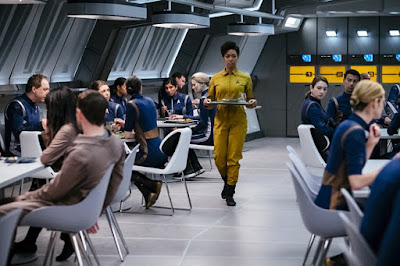Next week’s episode of Star Trek: Discovery will be the ‘mid-season finale’, an oxymoronic term which simply means that the season has been split into two parts and will resume in early 2018. Doctor Who fans will know the curious frustration which mingles with excited anticipation that more is to come as outgoing showrunner Steven Moffat wanked about with season breaks for a bit to enable him to supersize his bank account writing another hit BBC show about some detective or other.
I digress. Discovery is unlikely to lose viewers due to the break as the season so far has exceeded expectations and given audiences the most grown-up version of Trek yet. Crew members swear (yup, no substituting the word ‘fuck’ for ‘frack’ here, Battlestar fans), they experience genuinely complex emotions - Burnham and Stamets especially - and most of the scripts have delivered dark, reflective science fiction fit to grace movie screens, let alone TV.
Jonathan Frakes has observed that the cast seem as tightly bonded as TNG were which can’t harm the show in the least. A tight knit crew often create something together which can reach beyond the sum of its parts. But it’s not just the actors, every interview I’ve seen with producers, writers, special effects people, stunt teams etc, has revealed a genuine love of what they’re working on. When Star Trek itself is half a century old and has inspired a generation or two to go into various sides of the industry, you’re bound to end up with a hell of a lot of Trekkies gravitating towards each new addition to the franchise.
Trekkies within the scriptwriting team also ensures canonical matters are dealt with in a dignified manner even when aspects of canon are being bent out of shape - Sarek raised an adopted child as well as his own son Spock? Well that’s new on us but by the end of the first two episodes nobody was griping about it. None of the Klingons look much like Warf but this is all taking place way before he’s even born and maybe he’s just a rare pretty one, eh?
The look of the show is incredible, again reaching cinematic levels due to a combination of advanced special effects, incredible set designs and presumably a far larger budget than TOS ever had.
Most importantly of all because this is Trek, despite the backdrop of war, despite the body count being rather high (especially when you factor in Harry Mudd repeatedly destroying The Discovery in his looped attempts to work out how the spore drive works), despite esoteric and occasionally mind bending sci-fi plotting, the show remains focused on the people at the heart of the action. The central characters are all multi-layered and it is already evident that it might take several seasons to fully explore individuals such as Captain Lorca, Saru and Michael Burnham herself.
I’m a fan. Not a given despite my being a Trekkie (I’m not hot on Enterprise and I can’t say I’ve seen every episode of DS9). In dark times we seek escape and inspiration in fictional heroes who are also undergoing hard, even traumatising circumstances. Discovery is the perfect Trek for the modern age; Michael Burnham is us - a flawed yet true-hearted person faced with impossible decisions and irrevocable choices on an almost daily basis. Only she has better hair and gets to cop off with the sexiest guy on the ship.

